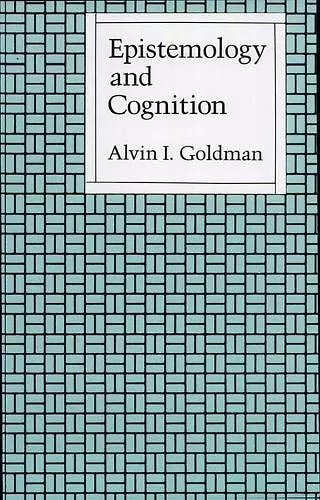Epistemology and Cognition
Format:Paperback
Publisher:Harvard University Press
Published:31st Jan '88
Currently unavailable, and unfortunately no date known when it will be back

Goldman is one of our leading epistemologists, known for his subtle and eloquent defense of the past decade's reigning epistemology, reliabilism. He is the source of many of the rich concepts and distinctions that have set the terms of current discussion and furnished epistemology with its current high degree of rigor and sophistication. Epistemology and Cognition is his masterwork, expounding all his fundamental ideas. -- William G. Lycan Very impressive. I myself have been awaiting Alvin Goldman's book for some time, and I think many others have been too. It's even more interesting than I had anticipated. Although many philosophers nowadays pay lip service to the idea that there is an overlap between psychology and philosophy, this book is unique both in its detailed attempt to spell out the theoretical framework behind this idea and in the depth and breadth of its account of relevant work in cognitive science. I believe it will have significant impact. -- Gilbert Harman
Against the traditional view, Alvin Goldman argues that logic, probability theory, and linguistic analysis cannot by themselves delineate principles of rationality or justified belief. The mind’s operations must be taken into account.
Whatever the target of our effort to know—whether we probe the origin of the cosmos, the fabric of man-made symbols and culture, or simply the layout of our immediate environment—all knowledge is grounded in natural cognitive capacities. Philosophers of knowledge must therefore make use of the science of cognition. So argues a leading epistemologist in this work of fundamental importance to philosophical thinking.
Against the traditional view, Alvin Goldman argues that logic, probability theory, and linguistic analysis cannot by themselves delineate principles of rationality or justified belief. The mind’s operations must be taken into account. Part I of his book lays the foundations of this view by addressing the major topics of epistemology: skepticism, knowledge, justification, and truth. Drawing parallels with ethical theory, it provides criteria for evaluating belief formation, problem solving, and probability judgment. Part II examines what cognitive scientists have learned about the basic processes of the mind-brain: perception, memory, representational constraints, internal codes, and so on. Looking at reliability, power, and speed, Goldman lays the groundwork for a balanced appraisal of the strengths and weaknesses of human mental processes.
In establishing a theoretical framework for the link between epistemology and cognitive science, Alvin Goldman does nothing less than redirect the entire field of study.
The scope of the book is enormous… Well-written and remarkably clear in exposition, Goldman’s book gives an overview of the state of the art in both epistemology and cognitive science at the same time that it presents an important, original position. * Choice *
Alvin Goldman’s book, Epistemology and Cognition, is a major work. It defines the subject of epistemology in a new and highly plausible way which makes the results of research in psychology and artificial intelligence extremely relevant to philosophical epistemology. In addition it offers a wealth of descriptions of this research and examples of ways in which it is relevant. This is a book that all philosophers should read. -- Gilbert Harman
Goldman is one of our leading epistemologists, known for his subtle and eloquent defense of the past decade’s reigning epistemology, reliabilism. He is the source of many of the rich concepts and distinctions that have set the terms of current discussion and furnished epistemology with its current high degree of rigor and sophistication. Epistemology and Cognition is his masterwork, expounding all his fundamental ideas. -- William G. Lycan
Very impressive. I myself have been awaiting Alvin Goldman’s book for some time, and I think many others have been too. It’s even more interesting than I had anticipated. Although many philosophers nowadays pay lip service to the idea that there is an overlap between psychology and philosophy, this book is unique both in its detailed attempt to spell out the theoretical framework behind this idea and in the depth and breadth of its account of relevant work in cognitive science. I believe it will have significant impact. -- Gilbert Harman
ISBN: 9780674258969
Dimensions: unknown
Weight: 608g
446 pages